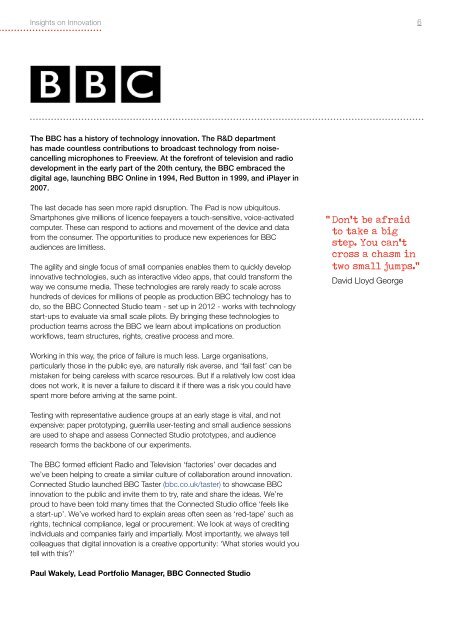O0YQ5
O0YQ5
O0YQ5
Create successful ePaper yourself
Turn your PDF publications into a flip-book with our unique Google optimized e-Paper software.
Insights on Innovation<br />
6<br />
The BBC has a history of technology innovation. The R&D department<br />
has made countless contributions to broadcast technology from noisecancelling<br />
microphones to Freeview. At the forefront of television and radio<br />
development in the early part of the 20th century, the BBC embraced the<br />
digital age, launching BBC Online in 1994, Red Button in 1999, and iPlayer in<br />
2007.<br />
The last decade has seen more rapid disruption. The iPad is now ubiquitous.<br />
Smartphones give millions of licence feepayers a touch-sensitive, voice-activated<br />
computer. These can respond to actions and movement of the device and data<br />
from the consumer. The opportunities to produce new experiences for BBC<br />
audiences are limitless.<br />
The agility and single focus of small companies enables them to quickly develop<br />
innovative technologies, such as interactive video apps, that could transform the<br />
way we consume media. These technologies are rarely ready to scale across<br />
hundreds of devices for millions of people as production BBC technology has to<br />
do, so the BBC Connected Studio team - set up in 2012 - works with technology<br />
start-ups to evaluate via small scale pilots. By bringing these technologies to<br />
production teams across the BBC we learn about implications on production<br />
workflows, team structures, rights, creative process and more.<br />
" Don't be afraid<br />
to take a big<br />
step. You can't<br />
cross a chasm in<br />
two small jumps."<br />
David Lloyd George<br />
Working in this way, the price of failure is much less. Large organisations,<br />
particularly those in the public eye, are naturally risk averse, and ‘fail fast’ can be<br />
mistaken for being careless with scarce resources. But if a relatively low cost idea<br />
does not work, it is never a failure to discard it if there was a risk you could have<br />
spent more before arriving at the same point.<br />
Testing with representative audience groups at an early stage is vital, and not<br />
expensive: paper prototyping, guerrilla user-testing and small audience sessions<br />
are used to shape and assess Connected Studio prototypes, and audience<br />
research forms the backbone of our experiments.<br />
The BBC formed efficient Radio and Television ‘factories’ over decades and<br />
we’ve been helping to create a similar culture of collaboration around innovation.<br />
Connected Studio launched BBC Taster (bbc.co.uk/taster) to showcase BBC<br />
innovation to the public and invite them to try, rate and share the ideas. We’re<br />
proud to have been told many times that the Connected Studio office ‘feels like<br />
a start-up’. We’ve worked hard to explain areas often seen as ‘red-tape’ such as<br />
rights, technical compliance, legal or procurement. We look at ways of crediting<br />
individuals and companies fairly and impartially. Most importantly, we always tell<br />
colleagues that digital innovation is a creative opportunity: ‘What stories would you<br />
tell with this?’<br />
Paul Wakely, Lead Portfolio Manager, BBC Connected Studio


